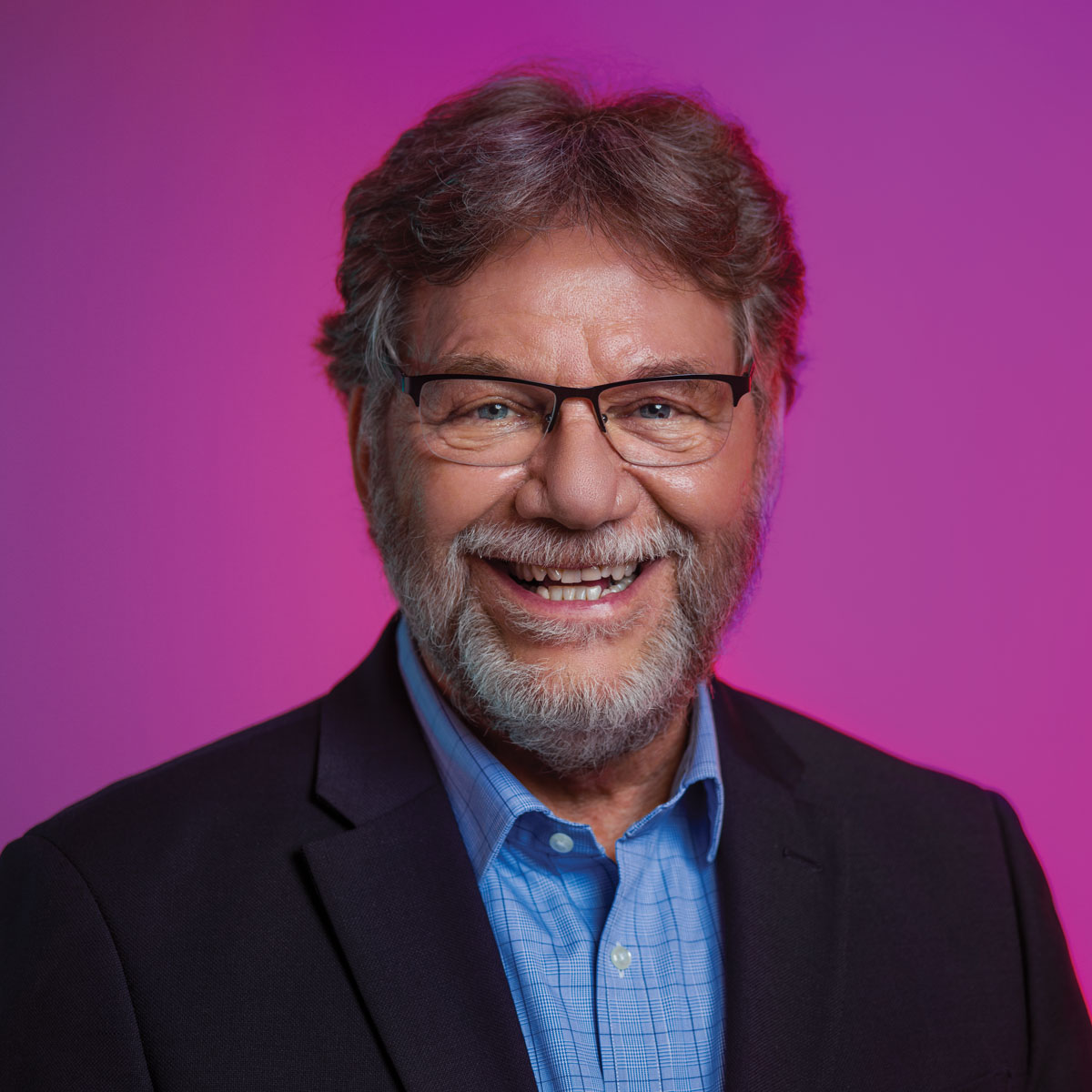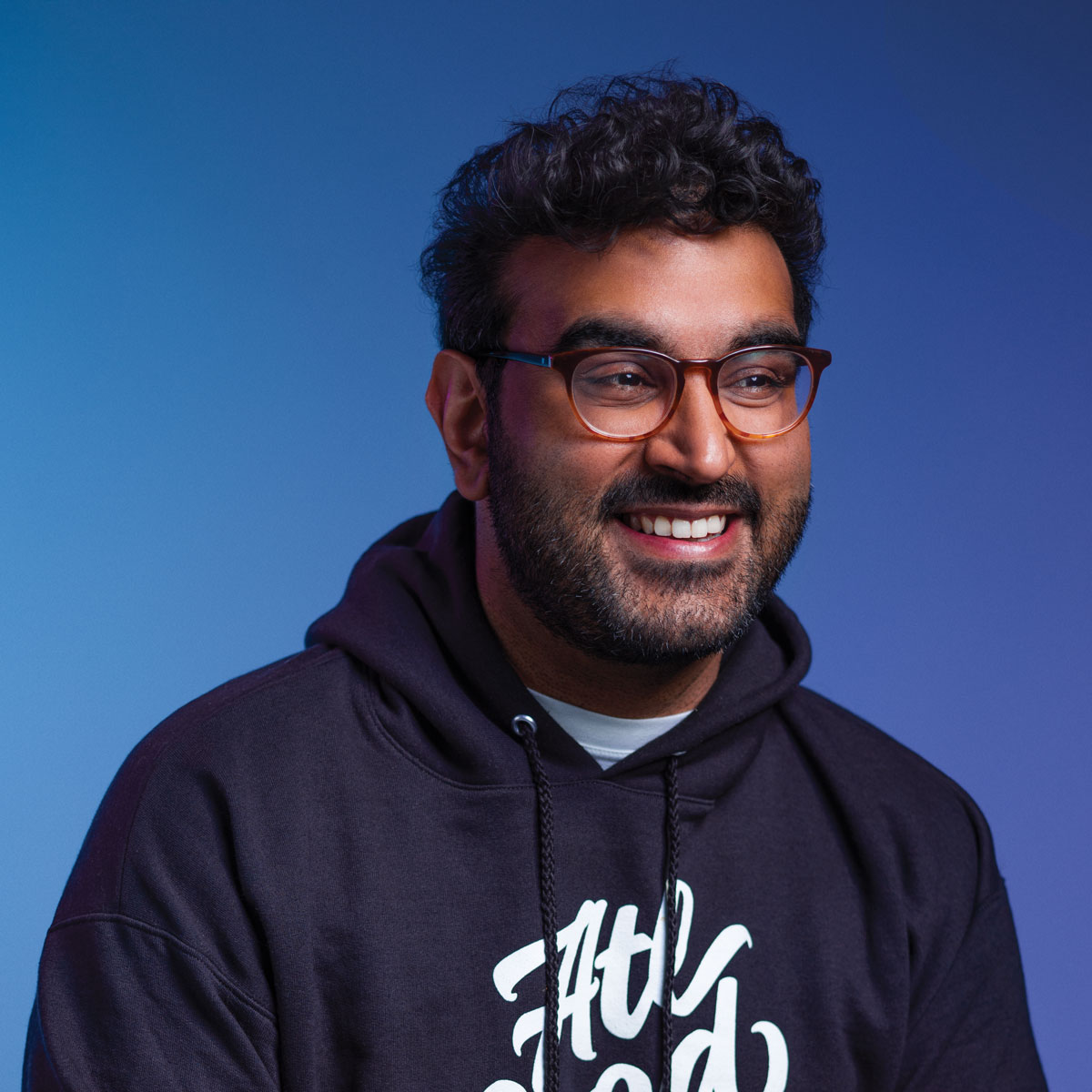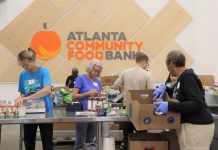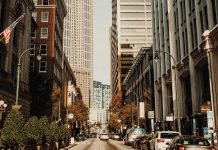
Photograph by Alex Martinez
Bill Bolling founded and was executive director of the Atlanta Community Food Bank for more than three decades. He serves on many boards and is chair for the new Atlanta Civic Circle nonprofit news organization.

Photograph by Alex Martinez
Rohit Malhotra is founder and executive director of the Center for Civic Innovation. He was formerly a White House government innovations fellow.

Photograph by Alex Martinez
Latresa McLawhorn Ryan is an attorney and the inaugural executive director of the Atlanta Wealth Building Initiative. Previously, she was a vice president of SunTrust Foundations and Endowments Specialty Practice.
BB: I started as a community minister at St. Luke’s Episcopal church way back in 1975. But about four years in, it was very obvious that no matter how many meals we served at that one congregation, there was a lot more to do. There was also so much waste. Our idea was simple: centralize the acquisition, decentralize the distribution. I was lucky enough to be part of starting that movement in the country. There were only about a half a dozen of us. I like to say I had the franchise for the Southeast.
There’s a huge amount of innovation in the nonprofit world now. Nowadays, a lot of young people naturally think as entrepreneurs. Part of what we had to do then and what we have to do now is educate people to new models. Certainly, this is a generational moment around race, inclusion, and equity. This doesn’t come every day, so you’ve got to be ready when that moment arrives.
RM: Innovation often just highlights, uplifts, and amplifies things that communities have been screaming for so long. Where we started was with community, making sure that community voices are heard because they’d been ignored for so long. Anything we’re working on right now is not new. In fact, that’s the irony of innovation. Innovation is not invention. Times like right now didn’t create inequality. It shone a bright light on the consequences of that inequality. I think we’re in a renaissance movement for community-based work.
LMR: We believe that the work has to be done simultaneously between grassroots organizations, ‘grass-tops’ organizations, and government. We are here to do dynamic work, we are not interested in incremental change. The disparities in Atlanta have lasted far too long for incremental change. A founding point of the organization was a Prosperity Now report that we commissioned. It highlighted that 96 percent of Black-owned businesses in the city of Atlanta are sole proprietorships. It also highlighted that the average value of a Black-owned business is $58,000 compared to $658,000 for a white-owned business. In our city where we enjoy the reputation of being the Black Mecca, there is great disparity. We are last in economic mobility: A child born in poverty in Atlanta has just a 4 percent chance of escaping it in his or her lifetime.
There was a time in our society where we looked out for each other, where we were a true community. We knew if our neighbor needed something. If a kid got in trouble, the local shopkeeper gave them a job to put them on the right path. There was a sense of concern about our neighbor—not from a charitable sense—but just a human wellness, human dignity framework.
BB: But until we get to this greater understanding of really listening to folks, we have what I call “living in the meantime.” If we’re not feeding and housing folks in the meantime, we’re never going to get there. On the other hand, if it’s just charity—the haves and the have nots—the power differential never empowers, right? But I always resist a little bit that it’s got to be all one or the other. If you’re providing charity, but you’re not doing that inclusive work and listening and learning from them, it’s never going to change.
LMR: If there was a benefit of Covid and the recent awakening, it was that the need was so great and so swift that organizations, institutions, had to rethink how they got to the people who needed the services. You couldn’t necessarily just do what you’ve been doing.
RM: [Right now] all of us are saying, Don’t worry, we’re going to create all these new programs and whatnot to get people out of poverty. But time will tell if we’re still saying that Atlanta is the most unequal city in the United States on [Atlanta magazine’s] seventieth anniversary.
The reason people get displaced is they get priced out of cities. They get pushed out. And then we get to say, Well, our poverty went away. We have seen this time and time again. If you go to the West coast, they’ll say, Poverty, oh my gosh, let me clutch my liberal pearls. What poverty do we have? Well, you pushed it out, right? Right now, Atlanta is still in a position where you can still be here. But we are so close to losing the very fabric of what this city was built on.
LMR: Atlanta loves Atlanta, and Atlanta is a great city so we get it. But so many people, even those who are experiencing the poverty, had no idea that this was a widespread issue for the city, because the narrative has been that Atlanta is this booming city.
BB: Never waste the disaster and emergency. There was a rethinking of philanthropy. I’m on the board of the Arthur M. Blank Foundation. We had a very serious conversation there, and I think that happened across the board. There were partnerships and collaborations that we’ve never had before. Food and housing are the two things that I mostly focused on. We said, Let’s use this. We would never wish a pandemic on anybody, but I think we might look back on it and say, “Wake up call.”
RM: For Atlanta to say it wants to be community-centered, it’s going to have to get back on the ground in community. I think we have to start talking to one another again. You cannot take a bulletproof bus through Vine City and then talk about how you’re in the neighborhood. You got to put your feet to the ground and respect and trust the leaders who have been there well before. There’s very few philanthropic institutions that actually spend time on the ground, which is why so many intermediary organizations have to pop up. So you have large corporation X or family X that funds money often through an intermediary organization, CCI included—with the hopes that we can become this trust broker between the financier and the actual people doing the work. And a lot of their metrics of success are counterintuitive to how actual community-based work happens. It’s built on trust. It’s built on conversation. It’s built on longevity of time. It’s built on flexibility. Those are not common things that you see in a grant application.
LMR: I’ll give an example. We have worked with Gangstas to Growers, a grassroots organization that makes hot sauce, and we’ve given them grants over the years. They work with formerly incarcerated youth. They take them through the entire process—from the farm in South Georgia where they grow the ingredients to wholesale development and marketing. When we started working with them, they were selling the hot sauce at festivals and events.
We sat down with them and said, Okay, let’s figure out what needs to happen to grow. A grassroots organization doesn’t always have the time to sit back and write a three-year strategic plan, right? So we helped the founder take some time to think strategically. We gave her some support so she could take some money to support herself. She hadn’t been paying herself for years. We helped hire a consultant to connect her to wholesale opportunities. They secured two wholesale opportunities last year, which was critical because they couldn’t go to festivals during Covid. That wholesale connection created more job opportunities for the formerly incarcerated youth that had been trained through that program. And she just had a baby. The extra dollars allowed her to take a step back and breathe a little bit. That’s being in partnership with proximity.
RM: We started working with Gangstas to Growers before they had a name. Even the fact that they were called Gangstas to Growers—funders didn’t want to meet with them.
[Our society] gives a lot of grace to the concept of “failing forward” and trying things. But [that’s impossible] if failure means [losing] your livelihood or your community’s wellbeing. Our organization spends a lot of time focused on making sure that [community] leaders are respected and validated and trusted—even if they don’t have the right language to bring to the table.
BB: To be in partnerships you’ve got to trust each other. I have been part of several nonprofits since I left the food bank. At Food Well Alliance we give out over a million dollars a year in grants. We support 30 urban farms in Atlanta. But you don’t just go in and say, “What do you need?” And they say, “We need money.” If you build a relationship where you’re listening to each other, we could say, Well, you’re a great grower, but you might not be very good in marketing.
We paid for farmers to go over to Malhotra’s shop to learn about telling their story. That takes time. And it takes real intention. It’s easier just to give the grant, say, Report to me in six months. In Atlanta’s non-profits sector, we have some good examples now of how we can slow down, build trust, listen to each other, and recognize each other’s gifts.
RM: Way too often people say, Well if you want money, here’s how you have to structure your organization or your business. Here’s how you’re going to have to play by my rules.
LMR: If an organization doesn’t have their financials in order, they need some additional support. But it’s not because they don’t know how to impact the community.
RM: When COVID-19 funding was distributed, it overwhelmingly went to larger, institutional non-profit organizations that were not run by people who look like me or Latresa. Many of those organizations that received capital are doing amazing, life-changing work. But other organizations inside communities—delivering food right there and then—were not even considered eligible. Not only because they don’t have the right language, they also don’t have the right ability to pick up the phone and say, Hey, I need $250,000. I’ll do your paperwork. No worries. I got a grant writer.
They’re too small, they don’t have an audited statement. You don’t have any validation of their work. So it’s scary, but that’s where the concept of trust comes in. But if somebody has been in their neighborhood for this many years, educating kids or getting resources, they might actually be a stronger vessel or vehicle for recovery and aid.
Non-profit organizations have millions, tens of millions, of dollars sitting in reserve funds and as endowment that is supposed to be used for an emergency. That’s what I was told reserve funds were for. These organizations are not using their emergency cash.
And the average person sitting in Oakland City doesn’t know what resources exist. That’s when you see a perpetual widening of inequality in this city. The Covid vaccine is a perfect example. Who’s signing up for the Covid vaccine right now? And who is having trouble being able to sign up right now? These are not accidents. They are structural issues that require intentional disruption. It’s not a matter of Do we care about our communities? Of course, we care about our communities. I think the issue is that we have not put trust into those types of organizations, and the larger institutions that are responsible for doling out resources, power, and capital are not embedded within those places. So a lot of those resources don’t get to where they need to get to.
In the first month, almost 50 percent of the 87 organizations that we work with were at risk of shutting down. That’s because they don’t have a six-month runway, a three-month runway.
LMR: I think that we can seize this moment of a new sense of reality and then build from there. There is no going back to normal.
I think what Georgia has proven, even with the last election, is that a collective voice matters. We have to resist the urge to go back into our silos. There’s often talk about the intersectionality of wealth—whether it be social capital or intellectual capital or financial capital—and how it impacts every sector: the arts, housing, education, criminal justice, entrepreneurship, food insecurity. There’s this connective tissue there.
BB: I am guardedly optimistic. And I say that because in the 60s and 70s I was that young Turk like Rohit. I was that inpatient activist who wanted things to change immediately. We blew things up, we made all the same points, and then they killed our leaders. Then many of the activists got discouraged and turned toward making money. So, we know that can happen.
Where I’m most hopeful is working with young people, how they are so entrepreneurial. I’ll just speak for myself, but they are a lot smarter than me. They’re wired up to be thinking as problem solvers. They are appropriately demanding change now. We have technology now, which means there are few secrets. We used to be able to hide things, but not anymore. There is the possibility of us really getting traction and sustaining progress this time.
RM: I love this city. I wouldn’t put myself through this work if I wasn’t obsessed with the potential of this city. It’s home for me, it’s personal. I am not interested in moderate progress. I’m interested in Bolling’s 60s and 70s “burn it down,” right? If it’s not working, burn it down. Now my obligation is to learn from the generation that has come before me.
One of the best conversations I ever had with Congressman John Lewis was when he told me the most important ingredient to movement building was to reinforce joy every single step of the way. To dance, to celebrate, to be colorful. And we don’t see that when we look at Civil Rights Movement pictures, they’re all black and white; and you assume that, that’s how the world looked, but it was colorful. It was vibrant. It was beautiful. This does come down to public policy. [With] that, Bill can do this all day long. I can do this all day long. Latresa can do this all day long.
This article appears in our May 2021 issue.














